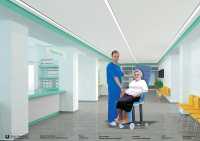
13 Nov Exercise During Hospitalization Improves Physical Functioning in Very Elderly
MedicalResearch.com Interview with:
 Mikel Izquierdo PhD
Mikel Izquierdo PhD
Head and Full professor
Department of Health Sciences
Public University
Navarra, Spain
MedicalResearch.com: What is the background for this study? What are the main findings?
Response: Acute hospital admissions are a major contributor to disability in the elderly. Despite resolution of the reason for hospitalization, patients (especially those who are frail) are often discharged with a new major disability. This is a problem that providers of health care and policy makers should prioritize given the expectations of further growth of the population segment composed by old people.
Traditional models of acute hospitalization for older adults seldom include a comprehensive approach to prevent hospitalization-associated impairment in functional and cognitive capacity. In contrast, exercise and early rehabilitation protocols applied during acute hospitalization can prevent functional and cognitive decline in older patients and are associated with a reduced length of stay and lower costs. Yet, patients with cognitive impairment or multimorbidity at baseline are commonly excluded from exercise intervention trials and only ‘conservative’ or ‘traditional’ programs (i.e., focusing on light walking while avoiding resistance training) have been typically applied to elders who are acutely hospitalized. Our intervention proved safe and effective to reverse the aforementioned impairment. We therefore propose that an individualized prescription of multicomponent exercise should become an inherent part of the routine management of hospitalized older adults.
MedicalResearch.com: What should readers take away from your report?
Response: Our study shows that an individualized, innovative multicomponent exercise intervention including low-intensity resistance training exercises performed during a very short-term period (5 days on average) provides a significant benefit over usual care and can help to reverse the functional decline associated with acute hospitalization in older adults Acute hospitalization per se led to a major impairment in patients’ functional ability during ADL, whereas the exercise intervention actually reversed this trend. We also observed an increase in the SPPB and in handgrip strength after the intervention, with the opposite response found in the control group. We believe this is also an important finding because there is meta-analytic evidence that functional capacity and both muscle strength (as assessed by SPPB and handgrip strength) and muscle mass tend to decrease in the elderly during hospitalization (at least in electively admitted patients), with muscle strength/mass being associated with disability, morbidity and cardiometabolic disease-related mortality.
These findings open the possibility for a paradigm shift from the traditional disease-focused approach in hospital acute care units for elders to one that recognizes functional status as a clinical vital sign that can be impaired by ‘traditional’ (bedrest-based) hospitalization but effectively reversed with specific in-hospital exercises.
MedicalResearch.com: What recommendations do you have for future research as a result of this work?
Response: Our results suggest that despite its very short duration, a multicomponent exercise approach is effective in improving the functional status (SPPB scale, Barthel index) of very old adults. It therefore seems that a more complete, multicomponent exercise intervention, such as the one applied here, particularly with the addition of resistance training, is needed to counteract the muscle weakness of older hospitalized patients, with muscle tissue deterioration being a main determinant of functional independence at end-life. Exercises adapted from the multicomponent physical exercise program “Vivifrail” to prevent weakness and falls should be tailored to suit individual capacity and needs (http://vivifrail.com/resources/send/3-documents/21-guide)
Citation:
[wysija_form id=”3″]
[last-modified]
The information on MedicalResearch.com is provided for educational purposes only, and is in no way intended to diagnose, cure, or treat any medical or other condition. Always seek the advice of your physician or other qualified health and ask your doctor any questions you may have regarding a medical condition. In addition to all other limitations and disclaimers in this agreement, service provider and its third party providers disclaim any liability or loss in connection with the content provided on this website.
Last Updated on November 13, 2018 by Marie Benz MD FAAD
